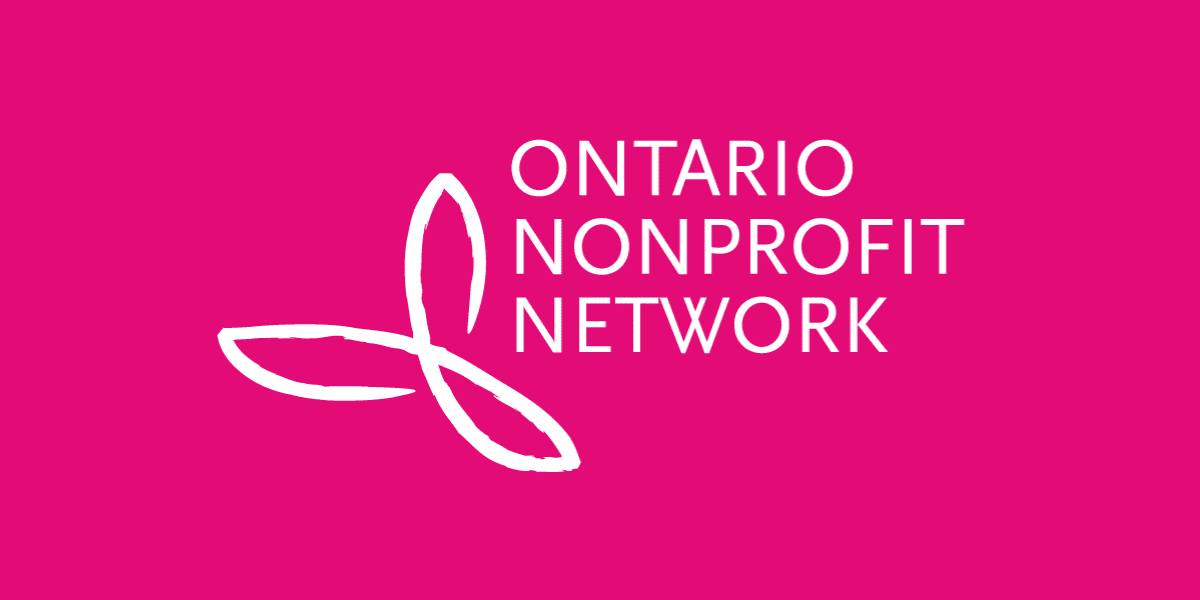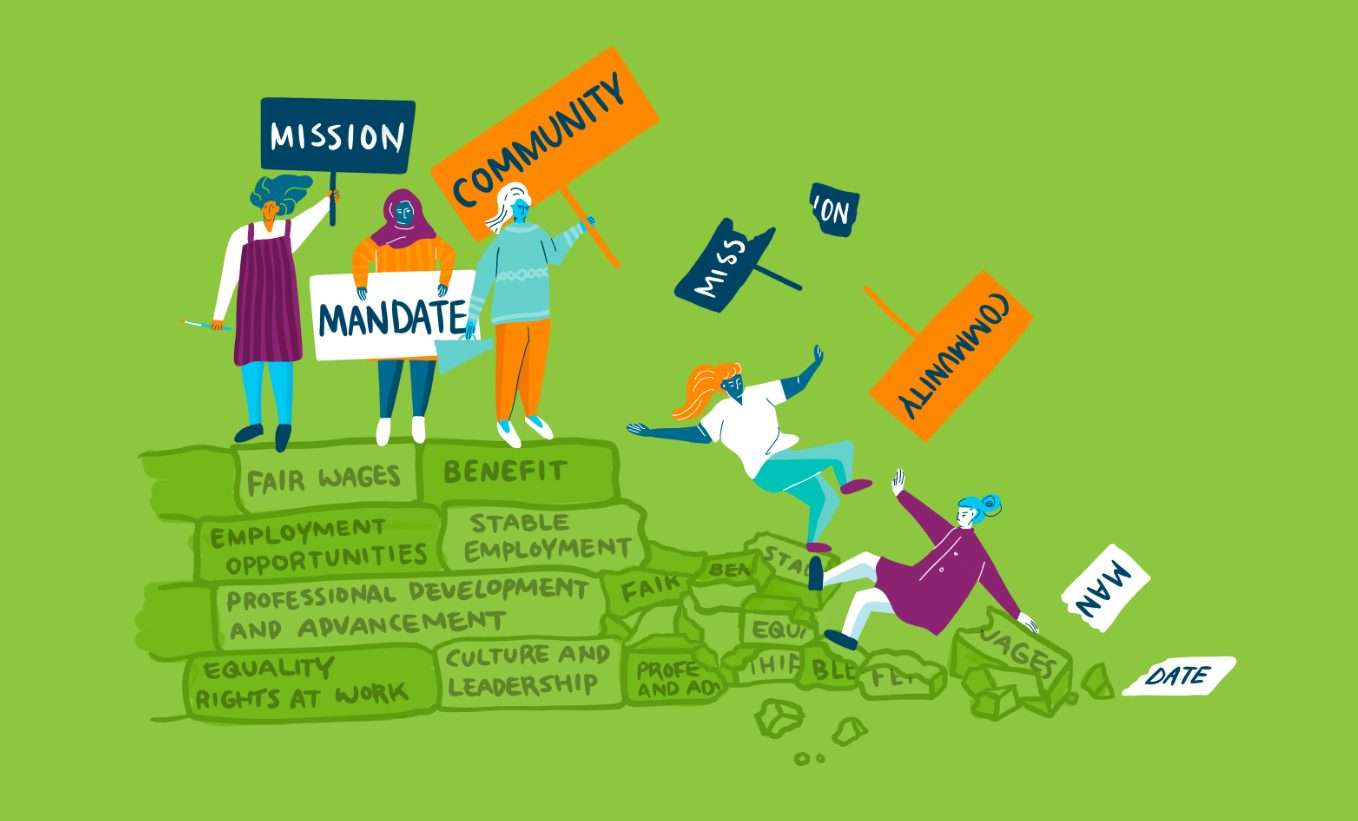
Blog
Expanding ONN’s decent work movement with women working in francophone nonprofits
This past summer ONN, in partnership with l’Association des francophones du Nord-Ouest de l’Ontario (AFNOO) and l’Assemblée de la francophonie de l’Ontario (L’AFO), conducted consultations with women working in francophone nonprofits. Facilitated by Debra Violette from PGF Consultants, we asked two groups of women respectively – senior leaders and frontline workers – what their experiences were of working in the nonprofit sector.
Find out what Debra and Pamela heard through this process, and what it means for the nonprofit sector.
Highlights from the consultations
Pamela: In 2018, I had the opportunity to hear from over 700 folks who identify as women, in addition to other identities, working in nonprofits across the province. What I heard was an immense passion for working in service of communities. For Black, Indigenous, newcomer women, women with disabilities and women from the LGBTQ2SI communities it went beyond passion, it was about seeing pressing needs in their communities that were not being addressed by traditional institutions and stepping up to fill in these gaps. However, I also heard disappointment with the lack of value given to their work, frustration at persistently low compensation, and anger at the way in which sexism, racism, ableism, and ageism interconnected to deeply harm women workers.
Debra: In 2021, I had the chance to hear from a relatively small but very diverse group of Francophone women who are passionate about their work in the nonprofit sector. What I heard echoes much of what Pamela heard in the first round of consultations. These women are highly engaged yet very lucid about the conditions in which they work. Though somewhat disillusioned about the possibility of creating a better work environment, they are not bitter and see certain advantages of working in this sector rather than in the for-profit sector, such as space for creativity, flexibility and the opportunity of moving forward causes that are dear to them. Salary remains the core issue with many facing financial insecurity, now and in retirement. Disadvantage comes in multiple layers, each adding on to the other: being a woman in the nonprofit sector vs being a man; working for a Francophone nonprofit vs for an Anglophone nonprofit; being a racialized woman vs belonging to the majority.
Reflections on Decent Work for Women
Pamela: As I sifted through learning circle transcripts and survey data, and recently read through Les Voix des femmes, one thing kept coming up for me – passion and duty trump decent work in our sector. But why is that? Why do people who are doing some of the most difficult work to ensure well-being of individuals and whole communities, who are often at the margins themselves, have to concede fair wages, stability, benefits, advancement, and healthy work cultures. Why do we have to choose between serving communities and good work? That doesn’t make sense to me nor does it sit well.
Debra: What impressed me the most was that the women I consulted with were able to name potential solutions. It was clear to them what needs to be done, including mobilizing networks and getting boards as well as donors on board. We’re talking about a major shift in our societal mindset: in how we view and value the work done by the nonprofit sector; work that cares for our society and is a motor to our economy; work done traditionally – and still today – mostly by women. Change won’t happen overnight, but I wonder how we can efficiently build the momentum for efficient and immediate steps forward.
The future of a decent work movement
Pamela: Our sector’s workers are not a monolith, so decent work movement building and actions cannot be either. Since ONN first began this work, we’ve added gender-based, intersectional, language, racial justice, and reconciliation lenses to decent work. It’s like decent work is a prism and these lenses are the lights we shine through to get a rainbow of decent work analysis and actions. If we don’t do this, we’ll just reproduce the same inequities we are proposing to eradicate for the communities we serve, rather than moving the needle on decent work for all.
Debra: Yet, is this another situation where the burden for change is in the hands of the ‘oppressed’? Though these women are certainly not passive agents only dealing with inequalities, quite the contrary! I believe true transformation can move upwards from the grassroots but it must be compounded by positive leadership. For me the real question is how we can come together, across subsectors, across linguistic, ethnic, cultural divisions, to build enough momentum and have enough power to effect true change?
The question we leave to you the reader is this: What bridges can you build at your own level to advance the decent work movement?
Here are some resources that can get you started:
Pamela Uppal (she/her) cares deeply about how women experience the world and so her work over the past 10 years has focused on creating gender-equitable systems by bridging frontline work, research initiatives, and policy advocacy. Currently, she is a policy advisor at the Ontario Nonprofit Network leading its decent work, care economy, and future of work portfolios.
Debra Violette (she/her) holds 20 years of experience in the development and management of projects and people. A self-qualified visionary, she stands out by her facilitation skills and her ability to grasp strategic issues. Debra has worked in international development, major event organization and in consulting in Ottawa, Toronto, Northern Ontario, West Africa and Quebec City.





